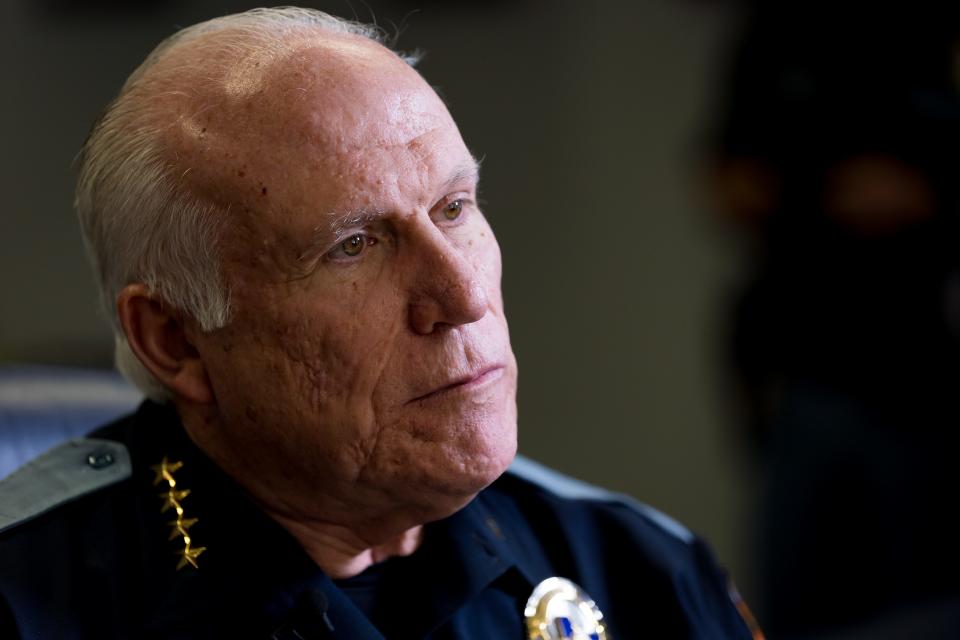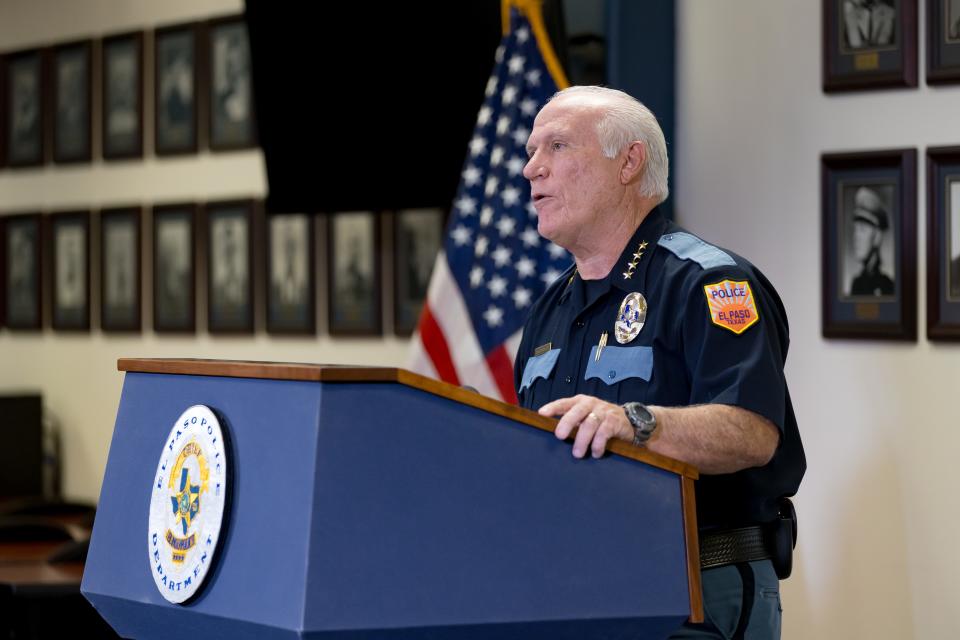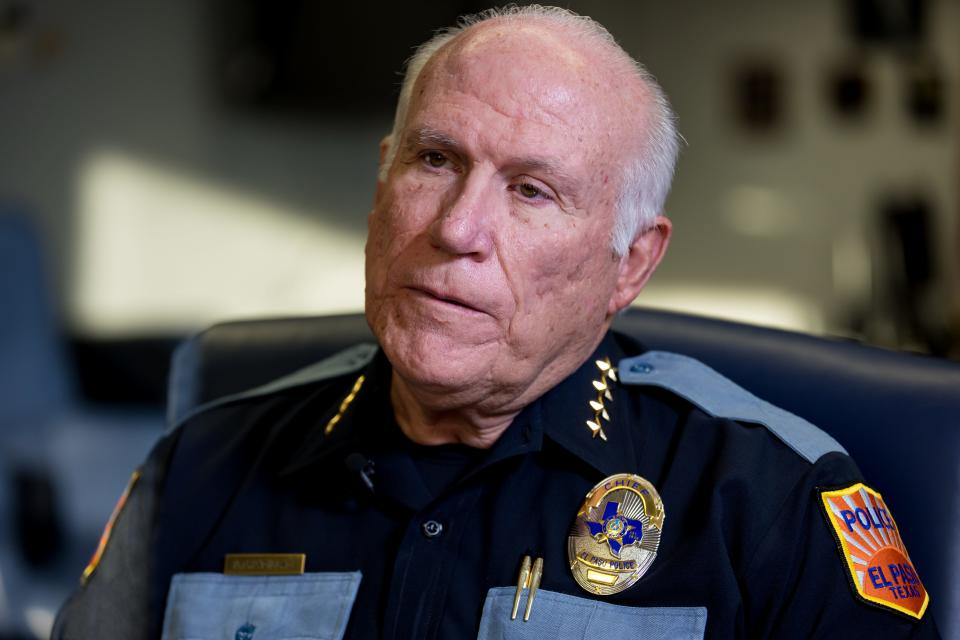El Paso Police Chief Peter Pacillas talks transparency, accountability and violent crime
New Police Chief Peter Pacillas is a familiar face among the rank-and-file of the El Paso Police Department.
After more than 30 years with the department — rising from patrol officer to sergeant to lieutenant and eventually assistant chief in 2009 — Pacillas is by all accounts a product of the department and late Chief Greg Allen.
Around El Paso, a community of nearly 680,000 residents, Pacillas is hardly a household name. His story beyond the uniform is somewhat obscure.
At a news conference in early October, Interim City Manager Cary Westin spoke about Pacillas' qualities and strengths while explaining what El Pasoans told him they wanted most from their new chief.
"Our community wants a police chief who understands El Paso's unique culture, who is collaborative, communicative, transparent and approachable," Westin said. "And one who will hold the department accountable and maintain a high standard of leadership and expectations for all of our officers."
"In my mind," he added, "Police Chief Peter Pacillas embodies all these characteristics."
Pacillas humbly talked about developing a strong relationship between the community and its police force.
After several weeks to adjust to his new role, Pacillas agreed to field some questions from the El Paso Times about policing in El Paso.
Pacillas seems guarded in speaking publicly about himself or his plans for EPPD — his first interview with the El Paso Times was recorded on two separate video cameras while at least three other EPPD officers listened nearby — but he did share his vision for what El Paso and its police officers need moving forward.
Pacillas says he plans to tackle the rising trend of violence in the city, an issue he described as the most pressing concern in El Paso. For that, he plans to employ enhanced surveillance measures, beef up enforcement task forces and recruit more officers.
More: Peter Pacillas named new El Paso police chief
Pacillas has seen the city through some of its worst crises, whether that be the Aug. 3, 2019 mass shooting or the constant ebb and flow of chaos at the U.S.-Mexico border, over his nearly 40 years in policing.
The chief, paid $210,000 annually, graduated from the El Paso Police Academy in July 1985 and was assigned to Central Patrol. Over the years, he's served on the department's bomb squad, criminal intelligence division, tactical unit, homeland security division and SWAT team.
He's hoping all that experience will serve him well as he looks to maintain El Paso's safe city status and the high standards expected from the EPPD.
Speaking in his customary calm, quiet tone, Pacillas discussed community concerns, issues of transparency and accountability within the department and provided some insight into his policing and management philosophies.
El Paso's biggest crime issues
Q: What do you see as the most pressing crime issues in El Paso right now?
Pacillas: "Well, we have the violence that's going on. We've surged a couple of task forces. It was pretty well documented in the media how one of those task forces stopped an individual with a rifle in the Cincinnati District. I think those officers and the task force personnel stopped another mass shooting at the entertainment district over there. So, seeing that, we're trying to address that. But fatalities, whether it's pedestrian fatalities or motor vehicle fatalities, addressing that through repositioning our traffic resources. And then the last one is … the most pressing property crime right now is theft of vehicles. Especially with the Hyundais and the Kias."

Q: Why Hyundai and Kia?
Pacillas: "From what I understand, there's some type of way that the criminals can exploit the ignition system on those types of vehicles."
Talking transparency
Q: When you were named chief, you spoke a lot about transparency. What will that look like for your administration? Do you plan to hold regular press conferences to keep the community informed on what is going on in the city and within the department?
Pacillas: "I'll be working with a (public information officer) staff to help get information out to the community, not just events that happen in the community, but there's a lot of good things that the men and women of the El Paso Police Department are doing on a daily basis, so that the community understands the caliber of police officers we have in there. Also holding regular meetings with news directors to make sure we have an open line of communication established and maintained."
Q: You have called the El Paso Police Department one of the best in the nation. Do you feel that gives you a platform to speak out on national policing issues?
Pacillas: "So, we are a member of the Major City Chiefs Association, and they have two — you have the main conference in the fall and then they have a biannual conference where all of us chiefs come together to help address the various really complex issues that we're all facing and come up with strategies and lessons that we can all share with each other."

Q: Being from one of the nation's safest major cities, do you believe you have a responsibility to take the lead in developing those national strategies?
Pacillas: "We're in a very unique position here being in El Paso directly on an international border. So policing and getting my counterparts across the nation to understand there are very unique challenges of policing on an international border. Not only that, we're directly on the Texas-New Mexico border. So, you have, really, as we say here in El Paso, where three states come together and two countries. Dealing with those issues and being so isolated, a lot of these chiefs work in metroplexes, so they can call on resources from some of the suburbs. We're very unique here that, should we have a major event, it's up to the law enforcement and the first responders to come together and deal with issues as quickly as we can. Because help isn't coming, not very quickly."
Q: In the past, it had been common practice to release the names of officers involved in shootings on the job. Allen ended that practice — will you renew it?
Pacillas: "Whatever we legally can release, we will release."
Allegations and accountability
Q: How is the department dealing with recent sexual harassment allegations and do you think those issues are indicative of a bigger underlying problem within the department?
Pacillas: "I'll go back to what I said in the press conference, we follow the same policies that the city of El Paso has, zero tolerance. As soon as we're made aware of allegations of sexual harassment or a hostile work environment, we will open up an administrative investigation. Since we get our people from society like everybody else, I don't think it's unique to the El Paso Police Department. You're dealing with human beings. But I think where we prove to the public is that we take it seriously and we thoroughly investigate on the administrative side. And if it raises to the level of a criminal violation, it will be investigated on the criminal side of the department also."
More: El Paso police lieutenant, sergeant arrested on sexual harassment allegations
Q: Along with the recent sexual harassment allegations, other officers were found to be covering up for their colleagues. Do you believe that is an isolated incident?
Pacillas: "As long as I've been on the department, as soon as the department becomes aware of those types of allegations or other allegations, an investigation is opened up. So, in my career, I've never seen where something has been hidden. I reemphasize, as soon as we're made aware of allegations, whether it's from the victim or a third party within the department, we open up an investigation immediately."
Addressing asylum-seekers
Q: What do you see as the department's role in addressing the ongoing migrant crisis? Do you see your role as more enforcement or humanitarian?
Pacillas: "Well, it's both. So, it's a humanitarian crisis … when you have people that are coming into an area that they just have no idea where they're in, they could be victims of crimes. So, to the El Paso Police Department, an El Paso police officer, myself, it doesn't matter why somebody's in our jurisdiction, our obligation and our responsibility is to protect them and keep them from becoming victims of crimes. And should there be a criminal element that's trying to prey on them, our responsibility is to stop that activity and put people in jail if we have a probable cause to make arrests."
More: El Paso migrant crisis: Downtown street closed; Fort Bliss MPs to help at border
Q: What does the enforcement side of that scenario look like?
Pacillas: "So, we did have to divert resources when we had the migrants congregating in different areas of town. We had to help the Office of Emergency Management with their shelter and security plan, once again, to make sure individual groups did not become victims of crimes."
Policing in an open carry Texas
Q: How have Texas gun laws impacted or changed policing during your career?
Pacillas: "We don't make the laws, the Legislature makes the laws. As far the concealed carry, or the constitutional carry, it doesn't change the fact that anytime a police officer shows up to a scene, as we're trained at the El Paso Police Academy, there's always going to be a weapon involved because the police officer's bringing it. So, you have to make sure that you're able, capable of protecting yourself and evaluating the circumstances of the incident as they develop."

Q: Other states have received opposition from law enforcement groups over constitutional carry proposals. Do you worry that constitutional carry in Texas makes routine encounters more dangerous?
Pacillas: "So, the criminal is the criminal element. It will disregard whatever law you want to talk about. So, if they're going to disregard weapon laws, they're going to have them anyway. The concealed carry or open carry actually proved itself out in the Cielo Vista shooting. You had a licensed concealed carry individual who stopped that criminal activity where somebody was going to be murdered. And who knows what could have happened if it had kept on going."
Stepping up 'intelligence-based policing'
Q: Can you describe the department's current video surveillance program?
Pacillas: "You're referring to the city watch program. We received grant funding … we use intelligence-based policing. So, those key points where it would help the officers in the field and the detectives who are following up to be able to respond or conduct investigations. Those cameras will be going up in key locations where we see the crime tends typically to spike."
Q: Have you heard any concerns from residents about that program?
Pacillas: "It seems like people support it. In fact, there was an incident when we first started doing this program, I can't remember the exact year, it actually helped us solve a murder in the Downtown area."
Q: What are your thoughts on the department's recent use of a controversial geofence warrant, which uses cell phone data to determine a suspect's location, to apprehend a murder suspect?
Pacillas: "Like everything we do, we have to make sure that we do not violate the Constitution of the United States. So, in order for us to get any warrant, the officer, the detective has to type up an affidavit, present it to a judge who determines if there is probable cause for a warrant to establish that we can get a search warrant or an arrest warrant. So there are checks and balances in the criminal justice system. So, if the judge, or if there's case law that has to be followed, our first priority is to make sure people's constitutional rights are not violated."
More: Controversial geofence warrant used to arrest suspect in El Paso lawyer's fatal shooting
Assessment of Aug. 3, 2019
Q: Can you describe your experiences during the Aug. 3, 2019, mass shooting in El Paso?
Pacillas: "Very surreal, I think for everybody, especially the families that were affected. The police officers who responded showed the community the finest examples and traditions of the El Paso Police Department. We had officers running in … the initial officer was by himself. He ran into that store not knowing. He knew there was an active shooter, but he did not know what he was going to encounter in there. But he did what his duty called him to do and went in there by himself until the second officer got on the scene."
Q: What was your role during and after the shooting?
Pacillas: "So you have to rely that the El Paso police officers and supervisors in the field are handling the situation. Our responsibility up in the chief's office was to get to the emergency operations center and help them get the resources they needed to help address the situation as it was developing."
More: 'I still take it personally': The El Paso Walmart mass shooter sentencing
Q: What were some of the things you saw as you were making those arrangements?
Pacillas: "How well the law enforcement community in El Paso responded along with the El Paso Fire Department to get the assistance to those who were wounded and to help the families at the reunification center and help provide them with information that was very difficult to digest and be able to make sure that we're getting out accurate information to the families who were affected."
Looking ahead
Q: What are your biggest priorities as police chief?
Pacillas: "For the city of El Paso to maintain El Paso as one of the safest cities in the United States. For the department, it's recruiting, recruitment. Going back to the society, everybody's looking, you see 'help wanted' signs everywhere, 'now hiring.' I think there's a uniqueness to the police profession is that there is a pretty arduous application process because the citizens of El Paso expect the El Paso Police Department to maintain its status and standards, so only the most qualified individuals become El Paso police officers."
This article originally appeared on El Paso Times: El Paso Police Chief Peter Pacillas sits down for his first interview

